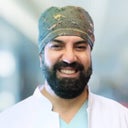Finasteride customized dosage for hair loss, is it correct?
Hi, I heard from experienced doctors that "taking finasteride 1 mg three times a week is enough. (I know this question is asked before but here is a totally different approach) because it's not matter how long it stays in blood (4 to 7 hours half life), what really matter is how long it stays in tissue where it has a half life of (30 days) so there is no logic in taking it daily". My question here is that correct, and where did they got this info that it stays 30 days for its half life? Thank you

